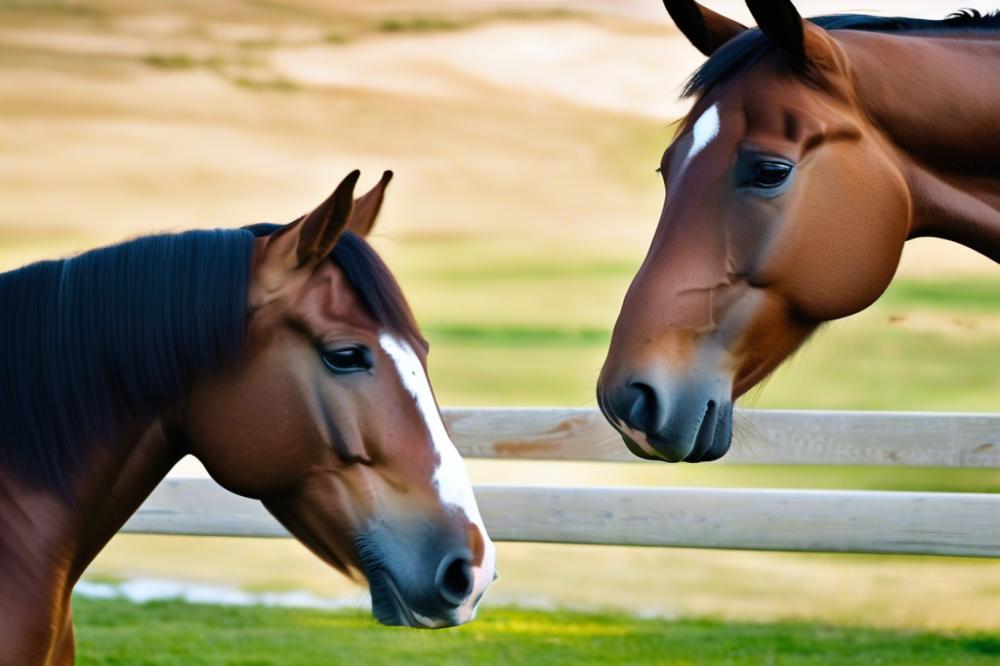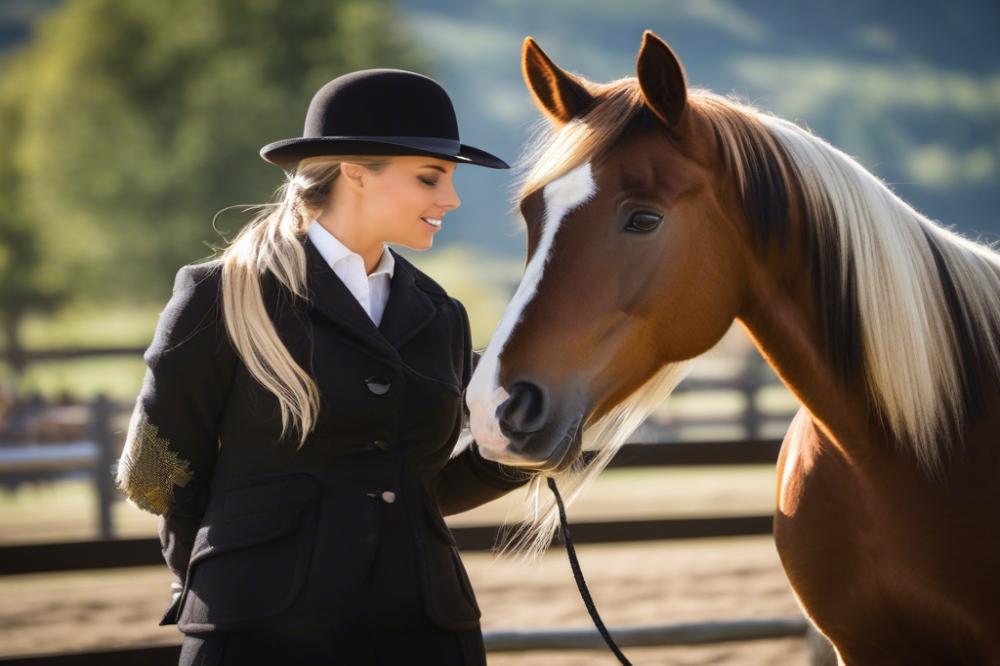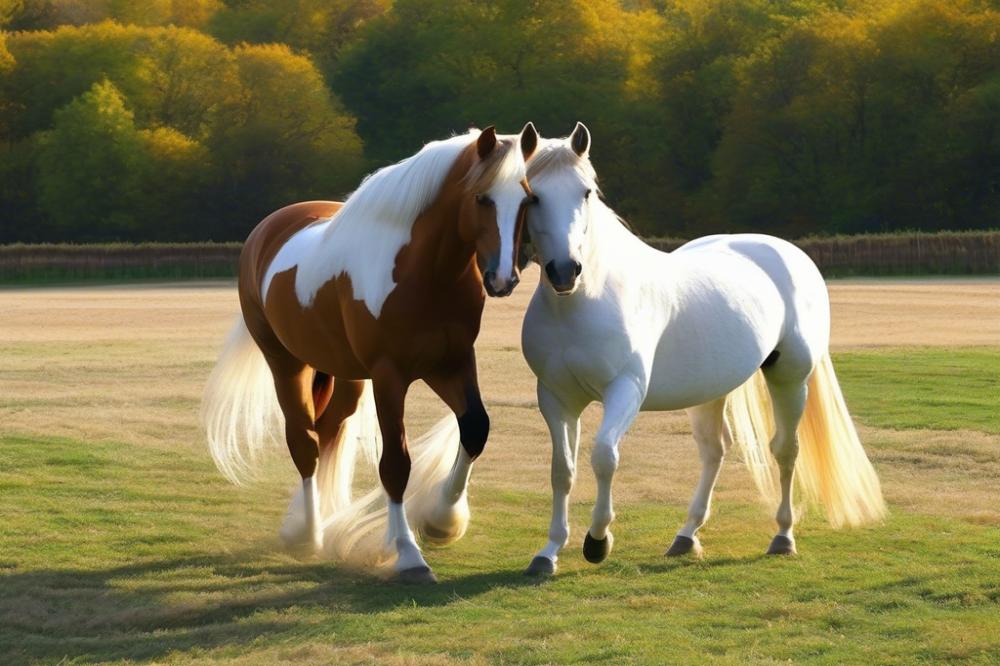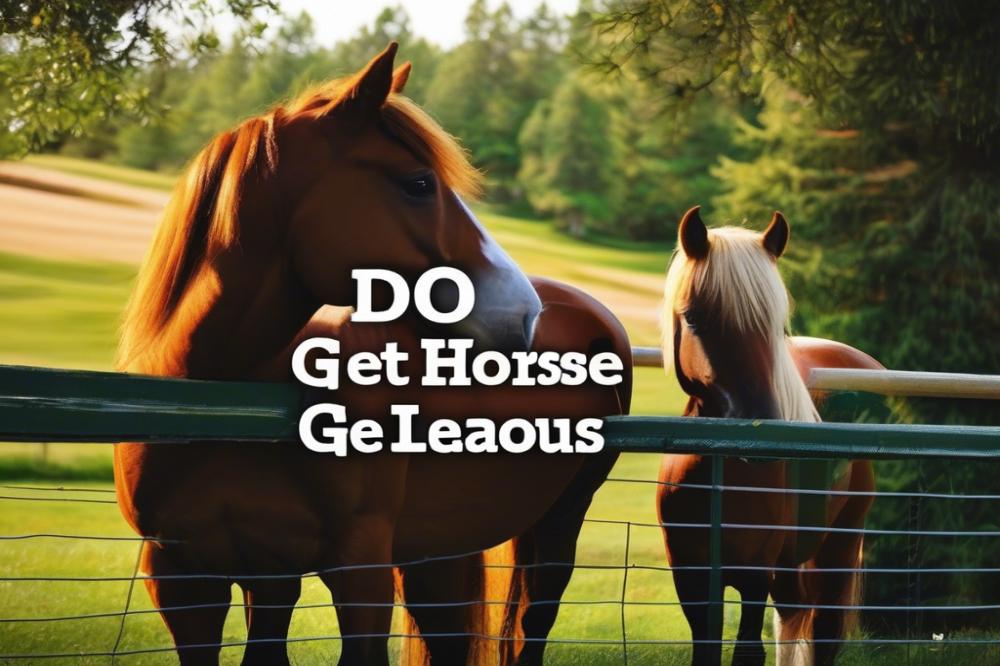Understanding Jealousy in Horses
Have you ever watched your horse react to another horse getting attention and wondered, “Do horses get jealous?” It’s a fascinating question that dives right into the intricate world of equine behavior. Horses are not just simple creatures that munch on hay and gallop around a field. They have feelings, thoughts, and social dynamics, much like we do. Understanding how jealousy plays a role in their interactions can help deepen our connection with these magnificent animals.
First, let’s clarify what jealousy means in the animal kingdom. Animal jealousy is often seen as a reaction to a perceived threat to an important bond or resource, such as food, space, or social attention. When it comes to horses, this could manifest as nipping at a buddy that gets too close while you’re grooming or trying to shove another horse aside to get your attention. It’s not just a cute quirk; it’s a reflection of their horse psychology and social instincts.
Now, why should we care about understanding this behavior? Grasping the concept of jealousy in horses is crucial for anyone involved in horse care. It can inform training techniques, improve horse-human interaction, and help maintain harmony in a group of horses. Just picture it: you’re trying to ride your beautiful beast, and the neighbor’s mare starts prancing about like she owns the place. If your horse feels jealous, you might find yourself struggling with an unexpected bout of misbehavior. Knowing how to manage these situations can save both you and your horse from unnecessary stress.
As we delve further into the world of horse behavior, it’s important to remember that each horse, from the stately British horse breeds to the lively ponies, has its personality. Some may display jealousy in more subtle ways, while others act out dramatically. Therefore, it’s like trying to fit pieces of a jig-saw puzzle together—understanding how those pieces, much like the parts of a stirrup, come together can create a clearer picture of your horse’s emotional state.
Understanding Horse Emotions

Horses experience a range of feelings. They can show happiness, fear, and even anger. Just like humans, these creatures have emotions that shape their behavior. A horse may whinny loudly in joy or stomp its feet out of frustration. Recognizing these feelings can help anyone who cares for them.
When we compare horse emotions to those of people, some similarities become clear. Horses can express jealousy, much like how a child might feel left out during playtime. Imagine a horse watching another receive treats. It might nicker or push closer, eager for attention. Such reactions show that animal jealousy can be very real in the equine world.
The Role of Social Structures in Horse Herds
Social structures matter a lot in horse herds. They live in groups, relying on one another for comfort and safety. Each horse knows its place in the herd. This established hierarchy affects how they interact. The lead mare might get the best resources, forcing others to wait their turn. This setup can lead to feelings of jealousy when a lower-ranking horse sees the leader getting treats or affection.
Have you ever noticed how a horse reacts when its buddy gets petted by a human? Jealousy can bubble up, causing some nudging and playful antics. This behavior is part of their social nature. They understand relationships and communicate their feelings through body language and sounds. Understanding horse psychology helps us provide better horse care and strengthen our horse-human interaction.
In addition to jealousy, horses feel happiness and anxiety too. A horse can brighten up when it sees its favorite human walking towards them. Conversely, if they are separated from the herd, they may panic. Such experiences add depth to equine behavior, showing that there’s more beneath the surface. Recognizing these emotions gives us insights into their daily lives and needs.
Signs of Jealousy in Horses

Behavioral Indicators of Jealousy
Horses communicate their emotions in various ways. When they feel jealous, you might notice some specific behaviors. Have you ever seen a horse pin its ears back? This action often signals irritation or discomfort. Watching for other signs is helpful too. Stomping, restless movements, or even whinnying loudly can indicate a problem.
Sometimes, horses become possessive about their space or food. They might try to push another horse away from a hay pile or block access to their owner. These behaviors suggest that something is bothering them. Horse emotions can be complex and varied.
Examples of Actions Horses May Display
Imagine two horses in a pasture. One horse is receiving a lot of attention from a human, while the other stands nearby. The neglected horse might start to display some attention-seeking behavior. This includes nudging the human or even trying to move closer. Not every horse reacts the same way, but many display signs of animal jealousy.
You might also see a horse who suddenly acts out aggressively. They might kick or chase another horse that gets too close to their favorite buddy. This response isn’t just random; it’s about their feelings. Horses have social structures, and their dynamics can shift quickly.
Another common scenario involves one horse getting groomed while another watches. The outsider may stomp their hooves or whinny in frustration. It’s almost as if they’re saying, “Hey, what about me?” This reveals a glimpse into horse psychology.
Impact of Environment on Behavior
The surroundings can significantly influence how a horse behaves. If a horse feels competitive for space, resources, or even human attention, it may lead to jealousy. Horses thrive in environments that foster social bonds. When these friendships feel threatened, confusion and frustration follow.
Imagine a barn where some horses get more time with the trainer than others. Those on the sidelines might develop feelings of envy. They watch eagerly, wishing for their turn. This highlights the importance of horse care and attention.
Space matters too. Cramped living conditions can create more stress. Horses in a large pasture usually have more room to establish their social order. Freer space allows for healthier interactions. Each horse can define its space without overwhelming emotions.
Ultimately, understanding equine behavior allows us to support our horses better. Simple observations can lead to meaningful changes in their lives. Good communication and care are key. Plus, who wouldn’t want a happier horse?
Factors Influencing Jealousy

Role of Social Hierarchy Among Horses
Horses are social animals. Just like humans, they have a pecking order. This hierarchy shapes how they interact with each other. A dominant horse often gets the best resources. Sometimes, this can lead to feelings of jealousy. When a lower-ranking horse sees the top horse getting more food or attention, it may feel left out. It’s like being the kid at school who never gets picked for the team. Understanding equine behavior means recognizing these social games. Horses might show signs of frustration or aggression to compete for attention.
Impact of Human Interaction on Horse Emotions
Human actions can influence horse emotions greatly. When people spend time with one horse, others may watch with interest or irritation. It’s similar to how siblings might react when one gets more affection from a parent. Positive horse-human interaction can build trust. However, if a horse feels overlooked or neglected, jealousy may creep in. The emotional bonds we form with these animals matter. If a rider gives all the love to one horse while ignoring another, feelings of jealousy may emerge. Horses thrive on connection, and it’s essential to be mindful of their feelings.
Differences in Jealousy Based on Breed or Individual Temperament
Every horse is different, much like people. Some breeds are naturally more social and may show stronger signs of jealousy. For instance, extensive studies suggest that Arabian horses can be quite expressive. Meanwhile, other breeds might handle changes in attention more gracefully. Individual temperament also plays a big role. A sensitive horse may react strongly to perceived favoritism, while a laid-back one might not care at all. Those differences can change how animal jealousy appears in the barn. Owners should keep an eye on their horses’ personalities. Understanding horse psychology is key to effective horse care. It can guide how we manage training and companionship in a way that minimizes negative feelings.
Jealousy vs Other Emotions
Understanding horse emotions can be a bit puzzling. When we think about animal jealousy, it’s easy to confuse it with rivalry or even possessiveness. These feelings may look similar, but they’re not quite the same. Jealousy often comes from a sense of threat, usually tied to a bond or relationship. Rivalry, on the other hand, is more about competition. It’s like two horses chasing the same carrot, trying to earn their place in the barn hierarchy.
Situational triggers can vary greatly. Picture this: one horse is getting all the attention from a human, while another stands off to the side. That’s a recipe for jealousy, right? In these moments, a horse may nicker or paw at the ground to express annoyance. Possessiveness usually appears when a horse feels a strong need to guard something—like their food or a favorite toy. This triggers different behaviors than jealousy. It’s more about claiming what is theirs.
Many horse-human interactions reveal interesting reactions. Have you ever noticed how a horse reacts when you pet another horse? They might stomp their feet or make a fuss. This reaction can often stem from jealousy. Horses bond with their humans and other horses alike. When that bond seems threatened, you’ll see their emotions sparkle.
Digging deeper into equine behavior helps us understand these nuances better. Imagine two horses in a pasture. One is getting a scratch from the human. Suddenly, the other gallops over, wanting to join in on the fun. That shuffle of hooves isn’t just a random trot. It shows a curious mix of jealousy and a desire for inclusion. Horse psychology can be quite fascinating!
With proper horse care, we can address these behaviors. Recognizing the signs of jealousy can help us manage their interactions better. Consistent routines and equal attention can lessen feelings of rivalry. Each horse has its own personality, making it important to observe individual reactions. Keeping notes on what triggers these emotions can be enlightening.
Next time you’re with horses, pay attention. You might just see their unique emotional world unfold right before your eyes. They may not express feelings like we do, but their horse emotions are rich and varied. Animal jealousy is a real thing among horses, and understanding it can deepen our bond with these incredible creatures.
Managing Jealousy in Horses
When it comes to horse emotions, managing jealousy can be a real challenge. If you notice your horse acting possessive, it’s important to take action. First, let’s dive into some practical tips for horse owners.
Practical Tips for Horse Owners
One way to prevent jealousy is through consistent routines. Horses love their schedules. Feeding at the same time every day creates a sense of security. When a horse knows what to expect, it can help reduce anxiety and competitive behavior.
Another useful tip involves creating a calm environment. Horses are sensitive creatures. Reducing noise and distractions during feeding time can help every horse feel more at ease. Also, using slow feeders can minimize rushing and give each horse its space.
Strategies to Reduce Competitive Behavior
To curb animal jealousy, try to avoid playing favorites. If you have multiple horses, they might compete for your attention. Spend time with each horse individually. Grooming or simply hanging out can strengthen your bond. Horses thrive on these moments, which helps with horse-human interaction.
Rewarding good behavior is crucial. If your horse exhibits calmness while others are around, give a treat or a pat. Positive reinforcement works wonders in shaping behavior, as it plays into their natural psychology. Emphasizing praise over punishment creates a better atmosphere for everyone.
Importance of Individual Attention and Socialization
Every horse is unique, and they have different social needs. Some might be loners, while others could thrive in groups. Pay attention to how your horses interact. If one horse seems left out, it may lead to jealousy. A little extra attention can go a long way in keeping the peace.
Socializing your horse with other animals can also be beneficial. Not all horse friendships are created equal. Sometimes, they bond with different animals or even other species. This helps in diversifying their social behavior and lessens any feelings of jealousy.
Regular turnout in a pasture allows them to roam and establish their pecking order naturally. Watch them closely. You might spot some playful interactions! Just like humans, horses also enjoy a good romp and some gentle rivalry as long as it stays friendly.
Research on Animal Emotions
Overview of Studies Related to Animal Jealousy
Scientists have been curious about animal emotions for years. They’ve even looked into the idea of jealousy in various species. Research suggests that some animals do experience jealousy, especially in social settings. Dogs, for instance, show signs of unrest when their humans pay attention to others. This raises a question: Do horses get jealous? While there’s less research focused specifically on horses, it’s clear that they have complex feelings. The way they behave around other horses, or even during horse-human interaction, provides clues.
Insights into Equine Behavior from Scientific Perspectives
Equine behavior offers a fascinating glimpse into horse psychology. Horses are known for forming strong bonds with their human caregivers and fellow horses. When a horse feels neglected or sidelined, it may act out. For example, a horse might kick at the barn wall or whinny loudly when another horse receives treats. Observing their reactions can hint at a deeper emotional experience. Studies indicate that horses communicate their feelings through body language, like ear position or tail movement. These signals can be subtle yet impactful. Understanding these signs can help in horse care and improve the overall relationship between horses and their handlers.
Future Research Directions
There’s so much to explore regarding horse emotions. Future studies could dive deeper into specific behaviors that suggest jealousy. Researchers might examine how competition for food or attention affects their behavior. New technology, like video cameras, could help scientists observe interactions in real-time. This could uncover whether horses experience emotions similarly to dogs or primates. The findings could enrich our understanding of equine behavior and enhance horse-human relationships. With more research, we might unravel the mysteries of horse emotions and improve how we care for these amazing creatures. After all, knowing how horses feel can only help us be better owners and friends to them.
Wrapping It All Up
As we’ve explored, horses share a rich emotional life that rivals our own. Looking at their behavior, it’s clear they can express feelings akin to jealousy. Many factors contribute to this complex emotional landscape, from their social structures to their personal bonds within their horse herd dynamics. Just like humans, each horse has its own personality and quirks. Some may exhibit jealousy when they feel overlooked, while others are more easygoing.
We hope you’ve gained an understanding of how subtle interactions give rise to these feelings in horses. When a new horse enters the picture or one horse receives extra attention, the reaction can range from suspicion to outright sulking, which reminds us how deeply they feel about their relationships. Observing these moments can provide insights into not just individual behavior, but the broader social constructs in horse communities. Remember the time when that spunky mare at your barn started acting up after her buddy got a new saddle? It’s moments like that which highlight the emotional depths these animals possess.
What does this mean for horse owners? It’s a call to action to recognize and respect these emotions. Building trust and fostering positive relationships with our equine friends should be the utmost priority. Additionally, regular engagement and understanding the signals of jealousy can help alleviate stress in our horses. Rather than fearing jealousy, we should embrace it as part of their rich emotional tapestry.
Next time you’re out at the barn, take a moment to observe interactions. Are there outbursts or quiet pouts that signal underlying emotions? Horses may not wear a dress code like at the Cartmel Races, but they’re certainly dressed in feelings. They can teach us more than we realize about empathy, companionship, and even forgiving after a little spat. By recognizing and responding to their emotional cues, horse owners can foster an environment of trust and harmony. So, let’s lace up our boots and get to understanding these magnificent creatures better!



